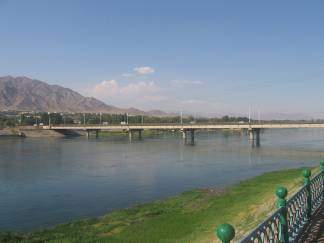
Water in Central Asia: Divides or Unites?
Water in Central Asia: Divides or Unites?
The visit of Kazakhstani President Nursultan Nazarbaev to Uzbekistan on June 14, 2013, and the positive rhetoric accompanying the outcome of this visit—the two countries’ leaders signed a Strategic Partnership Agreement—highlighted the two Central Asia republics’ deepening cooperation (see EDM, June 19). This visit was not a stand-alone event but was scheduled in response to Uzbekistani President Islam Karimov’s visit to Astana in September 2012, which also occurred amidst a surprisingly warm atmosphere. The relations between these two largest countries in Central Asia are deemed important for the whole region as they can lay out a framework for more efficient regional cooperation. Nazarbaev, a long proponent of Eurasian integration, has also been proposing Central Asian unity. His attempts to integrate the region had mostly been in vain to date, but the June meeting of the two presidents suggested that regional cooperation might have some substance after all.
The foremost conflicting issue in Central Asia is water, and it has both dividing and uniting potential. The sudden softening of Karimov’s position on Kazakhstan (which was much colder during over the past few years) is best explained by the uneasy outside pressure that Uzbekistan is currently experiencing. Tashkent is concerned about the prospects of its encirclement in Central Asia as other countries seem to have accepted the Russia-dominated Eurasian integration project. Russia’s increasing cooperation with Tajikistan and Kyrgyzstan could mean that these countries enjoy Moscow’s support for large-scale projects that are viewed in Tashkent as deeply troubling: the Rogun Dam (on the Vakhsh River, a tributary of the Amu Darya in Tajikistan) and Kambarata-1 (on the Syr Darya tributary of the Upper Naryn River in Kyrgyzstan). Russia has made several official statements in support of Rogun, but it only took physical steps regarding Kambarata-1, so far. On May 8, 2013, Russia’s President Vladimir Putin signed into law a ratification of the agreement with the Kyrgyz Republic on the construction of the Kambarata-1 Dam, pledging technical and financial support for the project (https://www.rbc.ru/rbcfreenews/20130508132705.shtml). As outlined in recent analysis of Russia’s Central Asia strategy (https://www.ponarseurasia.org/memo/changing-logic-russian-strategy-central-asia-privileged-sphere-divide-and-rule), Russia made “a shift from acting as a prospective mediator in regional water disputes to an active investor and backer of the Kyrgyz upstream position.”
In an effort to ease the complications of the shift, Russia invited Uzbekistan and Kazakhstan (as downstream countries affected by the project) to participate in the Kambarata construction. A bilateral agreement on Kambarata-1 was reached between Putin and Kyrgyzstan’s President Almazbek Atambayev in September 2012 (Interfax, September 20, 2012). But two weeks ahead of Putin’s visit to Bishkek, the presidents of Kazakhstan and Uzbekistan made a joint statement on the water question in Central Asia that underlined their countries’ disagreement with both upstream projects (https://en.trend.az/capital/energy/2062850.html). The two countries demanded that international expertise be applied to evaluating the project, a step which Tashkent already pressed vis-à-vis Dushanbe in the case of Rogun. Kazakhstan usually keeps a lower voice on water issues in Central Asia and the proposed dam in Kyrgyzstan does not make it to the top of Astana’s international agenda (an agreement on Chu and Talas rivers signed in 2000 by Kyrgyzstan and Kazakhstan is generally considered to be a best case in Central Asia water management). But Kambarata could challenge the development of Kazakhstan’s rural south. Agriculture currently does not play a decisive role in the Kazakhstani oil-based economy as does cotton in Uzbekistan, where water is a vital interest given its demographics, geography and economy, thus making it a politically contentious issue there. Uzbekistan is the second largest exporter of cotton in the world and more than half of the population lives in rural areas and are closely connected with irrigated agriculture (UNDP Policy Brief, “Addressing Urban Poverty in Uzbekistan in the Context of the Economic Crisis,” 2010).
The water question complicates the situation in Central Asia ahead of the North Atlantic Treaty Organization’s (NATO) withdrawal from Afghanistan which will lessen the United States’ involvement in Central Asia affairs, according to most analysts, and expand Russian influence in the region. Islam Karimov’s recent disgust with the Uzbek labor migrants who work in Russia, calling them “lazy” (https://top.rbc.ru/society/24/06/2013/863145.shtml), highlights the Uzbekistani leader’s frustration with Russia’s increasing leverage in the region. The Central Asian water question has always divided the region into upstream and downstream sides, and all five countries have been involved in the conflict depending on whether they need water for energy or for agriculture. Therefore, a change in Russia’s traditional role as regional mediator into a more active player and even a stakeholder (in the case of Kambarata-1) may exert additional pressure on Uzbekistan to seek more stable cooperation with its most natural partner—downstream Kazakhstan. In turn, Kazakhstan’s softer regional balancing initiative—Nursultan Nazarbayev proposed a dialogue and offered concrete help to Kyrgyzstan and Tajikistan for resolving their energy problems—could be more acceptable to Uzbekistan.
Is the Tashkent-Astana rapprochement sending a signal that closer regional cooperation may be reached? The solution to the water conflict in Central Asia arguably lies in a development of a mutually beneficial water-energy exchange regime, which requires coordination between countries on a much higher level than has been present currently. Regional cooperation could help the Central Asian republics continue to successfully balance their relations vis-à-vis Russia after the US withdrawal from Afghanistan. Yet, these prospects are quite fragile. Even Uzbekistan and Kazakhstan’s bilateral relations are not stable enough. A recent media exchange between Uzbek economist Rustamzhon Abdullaev and Kazakh analyst Daniyar Ashimbaev on historical territorial claims suggested that both countries maintain an uneasy perception of their neighborhood. One Kazakh blogger suggested that to avoid territorial claims, the two countries should just create one state (https://kazbei.org/themes/276-kto-komu-dozhen-prisoedinitsya.html?lang=ru). But this solution to the region’s outstanding conflicts is unlikely to be taken up by any government for the foreseeable future.


